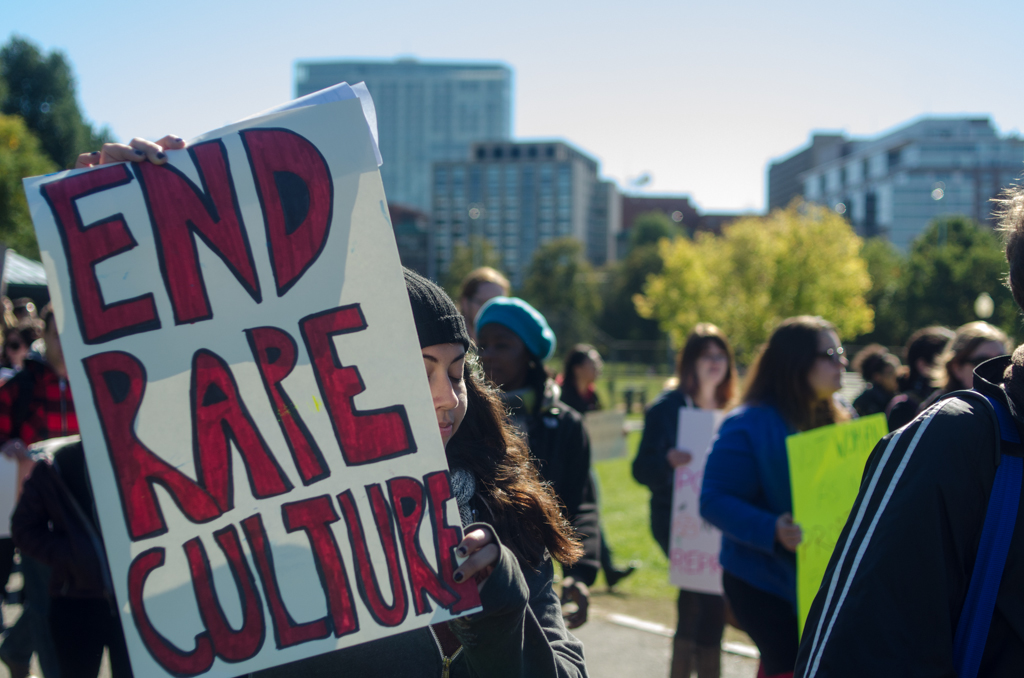As the first day of school looms, students are preparing by buying school supplies, moving into dorms, and figuring out where their classes are. But one issue students shouldn’t have to prepare for is rape culture on campuses.
Unfortunately, sexual assault and rape culture is a big concern for students with increasing awareness of the problem across Canada and the fact that post-secondary institutions have done a poor job of addressing it. WAVAW Rape Crisis Centre says grade 12 girls have expressed concern over sexual violence being “inevitable” at colleges and universities.
“The idea that rape and sexualized violence on campus is inevitable is fed by a lack of leadership engagement to hold campuses to a different standard,” explains Ariana Barer, the Educational Outreach Coordinator with WAVAW. “People kind of see partying culture and rape culture on campus as inevitable, it’s just part of your university or college experience and we believe that that’s a rape myth.”
This rape culture often manifests itself at frosh weeks, which set the tone for the school year. In 2013 stories about frosh week rape chants at the University of British Columbia and St. Mary’s University made headlines. Lucia Lorenzi author of the Body Politic also wrote about her experience with rape culture at UBC frosh week. This is significant as according to the Canadian Federation of Students many on-campus sexual assaults happen during the first eight weeks of classes.
But when it comes to combating sexual violence the advice often given to students involves tips like not walking alone a night. While that can be an important part of safety planning it takes the onus off of administration to ensure that their campuses are safe spaces that foster a culture that doesn’t tolerate violence rather than one that blames victims.
“It’s not about drinking or clothing or the right lighting or any of those things that we see being blamed again and again for sexual assault, this is about how we value women and all those who are targeted for sexualized violence of any gender and their right to access higher education in a culture that respects them,” says Barer.
So how do we begin to combat a culture of sexualized violence on campuses in a way that holds school leadership accountable? This year WAVAW is reimaging what frosh week means by organizing a feminist frosh week across campuses in British Columbia’s lower mainland.
It will begin with a rally on Sept 6 called Take Back the Campus: A March to End Rape Culture, a play on the Take Back the Night march. Different events will also be held across campuses during the week as part of the feminist frosh week calendar. Last year the Womyn’s Centre at Carleton University held a similar Fem(me) Frosh Week.
“We are really demanding post-secondary leadership to take responsibility in taking action that sends the message that women aren’t responsible for violence committed against them and that sexualized violence isn’t acceptable on campus,” says Jordan Pickell, a Sexual Assault Counsellor at WAVAW.
Progress has been made by some provincial governments on this issue. In B.C. the Liberal government recently passed Bill-23, the Sexual Violence and Misconduct Policy Act requiring post-secondary institutions to develop sexual assault policies. Campuses across Ontario will also have to adopt these policies by January 2017 as a result of Bill-132, the Sexual Violence and Harassment Action Plan.
Barer says that these policies are strengthened by actions like feminist frosh week that help to shift campus cultures. “We know that without a shift in culture policy can only go so far because policy is implemented by people who may or may not hold the values of a society that lead to this in the first place,” she says. “We need to create campus cultures, the context for that policy, where sexualized violence against students, staff, faculty, is not tolerated and is dealt with in just meaningful and timely ways and that’s what lacking right now.”
One school that has been leading the way in B.C. when it comes to addressing sexualized violence is Vancouver Career College. In 2013 they worked with WAVAW to launch the C.A.R.E. About Gendered Violence project where they developed an action-plan to prevent violence and support survivors on campus. And administration has committed to keep the work going.
“Essentially we’re holding that up as an example to say to other post-secondary leadership, ‘what will you do to to address sexualized violence on campus? It’s not impossible, rape culture is not inevitable, it can be addressed here’s how we’re doing it over here’,” explains Barer.
While it is the responsibility of university leadership to make these changes, it has been the efforts of students that have spurred the charge. For example, the brave women that came forward at UBC, and Paniz Khostoshahy a student at McGill have raised awareness about how campuses are failing survivors and put pressure on administration to make change.
“We know that there are students who are pushing to have sexual assault centres on their campus if there aren’t any, we know there are students who are trying to create safer spaces, who are trying to create a campus that feels more respectful of their identities and their right to be there and their right to feel safe and we encourage that,” says Barer.
Should students choose to do so, there are lots of ways that they can hold school leadership accountable and make campuses safer spaces. One way is to host events like feminist frosh week that counter rape culture. They can also give feedback on their school’s sexual assault policy, tell campus leadership and student government what their needs are, and demand better sexual assault services.



